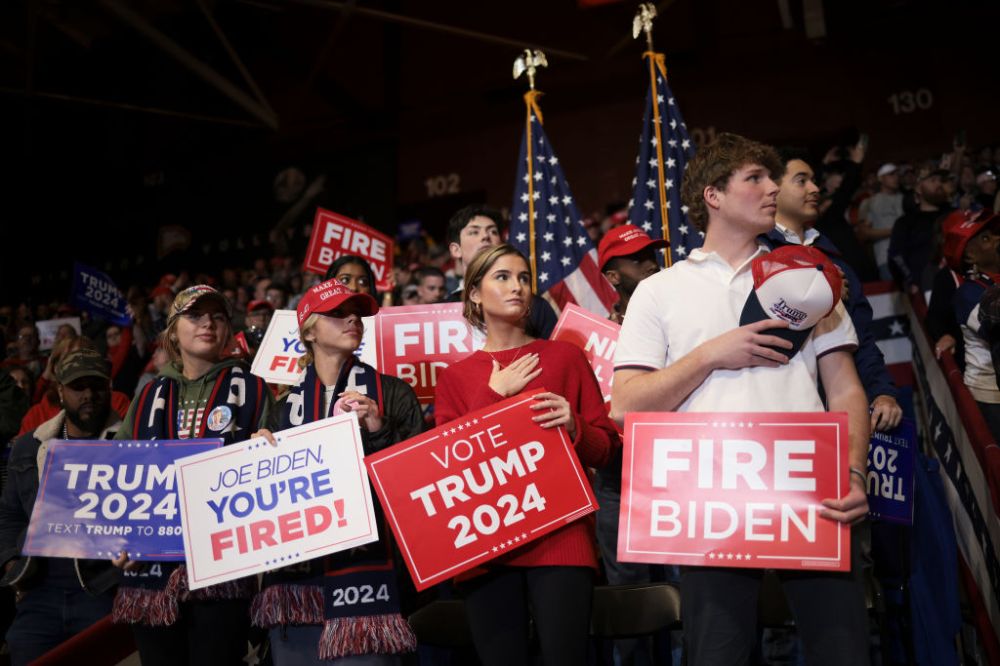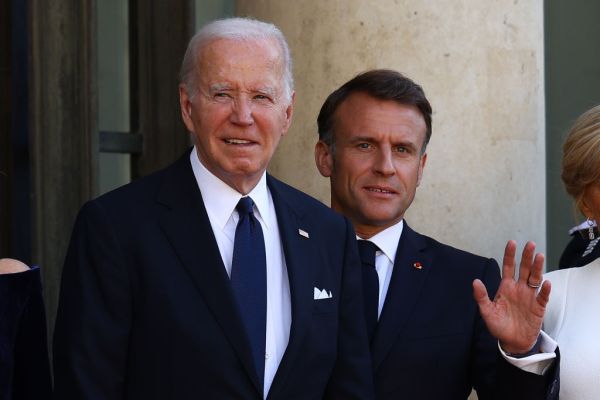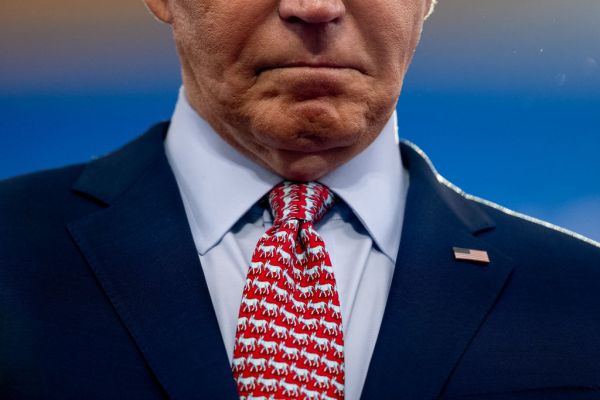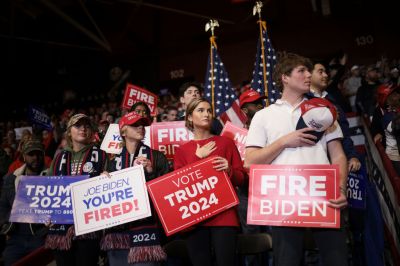If you had to explain the state of the presidential race by making assumptions about which way different age groups are leaning, what would you assume?
You, the well-informed Dispatch reader, surely know that younger Americans tend to lean left while older ones tend to lean right. Democrats have carried the under-30 vote in the last eight presidential elections, while Republicans have carried the 65-and-over bloc in the last five. As Winston Churchill famously (yet never actually) said, “If you’re not a liberal when you’re 25, you have no heart. If you’re not a conservative by the time you’re 35, you have no brain.”
So you might reasonably assume that Donald Trump’s narrow lead in national polling is due to those two trends accelerating. There’s an arms race of sorts between the parties to see who can pile up more votes among the age cohort that typically favors them; Trump must be earning huge margins among senior citizens to offset Joe Biden’s formidable lead among young adults.
It’s a sensible assumption. And it’s easy to tell a political story that supports it.
Of course older people must be growing fonder of Trump over time. Senior citizens are naturally prone to believe that the country is declining as younger generations gain social power at their expense. They’ve heard alarming things about skyrocketing crime. They’ve scratched their heads about “woke” nonsense being taught in schools. If anyone should be susceptible to a nostalgia pitch from a law-and-order strongman about “making America great again,” it’s them.
And of course younger people must be growing fonder of Biden over time. Being socially progressive, they despise the reactionary forces behind Trump. They’ve been bribed repeatedly by the president with policy reforms too, from forgiving student-loan debt to reforming marijuana regulations to seeking to reinstate the Roe regime on abortion. Oh, and there’s also the small matter of Trump having sought to disenfranchise them en masse four years ago by overturning an election in which the 18-29 age cohort favored Biden by 24 points.
It must be, then, that Trump leads slightly in the polls because he’s cleaning up with older voters to a slightly greater extent than Biden is cleaning up with younger ones. At a time when the two parties have grown ever more polarized, it shouldn’t surprise us that the same thing might be happening among different age blocs.
Perfectly logical. And totally wrong.
The bizarre truth is that both candidates are losing support among the age groups that have traditionally backed their parties. Poll after poll shows Trump cutting deeply into Biden’s lead with young voters. The only thing that’s keeping the president from falling far behind in the race is his surprising strength with older Americans, giving him a puncher’s chance of becoming the first Democrat since Al Gore in 2000 to win the 65-and-over group outright.
American politics has undergone some weird demographic realignments in the Trump era, but this one is weirder than most. Why on earth are kids warming up to Republicans while their grandparents are warming up to Democrats?
The answer is complicated. And not just because we don’t do monocausality here at The Dispatch.
No single factor explains young adults’ growing receptivity to Trump, but there is one that accounts for much of it: It’s the economy, stupid.
Young voters are new to the labor force, aren’t earning much money yet, haven’t had a chance to build savings, and in many cases are carrying substantial student debt. The last thing they need is another financial burden. But that’s what they’ve gotten under Biden courtesy of the worst inflation in 40 years.
They’ve also been saddled with rising interest rates aimed at cooling inflation that have made major life decisions costly. Some in their late 20s or early 30s who’ve been saving for a down payment on a home have been forced to postpone their dream indefinitely due to the prohibitive expense of a new mortgage.
So no wonder more young adults are turning to the Republican as the lesser of two economic evils. One Democratic pollster who’s surveyed twentysomethings framed the stakes of the election from their perspective starkly to Puck. “Their questions are not about democracy,” he said. “Their questions are: Will I ever not need roommates?”
No wonder too that older adults are less susceptible to economic arguments for a Trump restoration. Many are sitting on nest eggs that buffer them against inflation and continue to benefit from very favorable interest rates on their mortgages. They can tolerate a little financial pain in the name of not returning a lunatic to power.
There’s another difference between the two age cohorts that helps explain why younger adults are drifting right while older ones are not. They get their news (or “news”) from different sources. One group relies heavily on establishment media while the other favors user-created content that, overtly or in spirit, often presents itself as counter-establishment.
“Older voters … are far more likely than the youngest eligible voters to consume traditional media, like newspapers and network newscasts; younger voters are increasingly tuned out or get information from places like TikTok,” NBC News noted earlier this week. “An NBC News poll in April found Biden had a more than 50-point advantage among newspaper readers but trailed by 26 points among voters who said they didn’t follow political news.”
The example of TikTok is instructive. Its consumer base skews famously young, with more than half of Americans aged 18-34 now among its users. Yet when Trump recently joined the platform, he rapidly built an enormous following that already dwarfs Biden’s. He’s fishing for votes in a pond of young adults and, from the looks of it, is getting plenty of bites. That doesn’t typically happen for Republicans.
But it stands to reason, no? Those predisposed to back Trump naturally prefer media platforms that welcome counter-establishment content and the type of counter-establishment content that flourishes on those platforms may plausibly be steering less politically active users into being more receptive to Trump. Twentysomethings who spend their time endlessly scrolling on a Chinese propaganda outlet will inevitably come to different conclusions about whether the 2020 election was rigged, say, than seventysomethings who read the Washington Post will.
The medium matters. The, shall we say, “unique” information that young adults are absorbing is softening them up toward gonzo populism.
There’s one more essential yet underrated component to the drift toward Trump among young adults. Buried within a phenomenon related to age is a phenomenon related to gender.
Young American men aren’t doing well, you may have heard. They attend college at a lower rate than women do, which reduces their earning potential, which in turn reduces their mating potential. Many aren’t working; many more are single and lonely; suicide rates have accordingly risen. Notably, they’ve begun to diverge politically from young women, who now identify as liberal to a much greater extent than they did a decade ago.
Earlier this week CNN’s Ron Brownstein flagged a recent poll that found Biden’s advantage among young women to be roughly the same at this point of the campaign as it was in 2020. The sea change in his position has come among young men, who now support him by a margin of just 6 points over Trump after supporting him by a margin of 26 points at this stage four years ago.
The president isn’t losing “young voters”—he’s losing young men specifically. And Brownstein has a theory why: If young men are insecure about having fallen behind young women, naturally a movement based on an “implicit promise to restore traditional racial and gender hierarchies” will appeal to them. When Trump talks about making America great again, it’s not just the olds who feel a pang of nostalgia. It’s young guys who’ve been told that women don’t need them anymore.
Every time Trump associates himself with some macho cultural spectacle that’s popular with “bros”—UFC, Joe Rogan, pro wrestling—it’s a reminder that he believes unapologetically in letting men be men. For young women, there’s Old Man Biden and the alphabet soup of gender identities his supporters are forever demanding that the rest of us respect. For young men, there’s Donald Trump, a guy who once boasted about his ability to grab ‘em by the you-know-what with impunity and got elected president anyway.
Those young men might plausibly cost Biden the presidency in November—unless he can convince their grandparents to turn out and vote Democratic this time instead. And you know what?
He just might.
The idea of the “woke” party making inroads with senior citizens seems so preposterous that respected pollsters have taken to double-checking their work to make sure the trends they’re seeing are real.
They appear to be real. The oldest president in U.S. history, a man deeply unpopular with the wider electorate, is an above-average performer within his own age cohort relative to recent Democratic presidential nominees.
And maybe that’s no coincidence. In a New York Times poll published in December, voters aged 65 and over were far more likely than any other age demographic to say that Biden has the “mental sharpness” needed to be president. Overall, the public split 35-62 on that question; the youngest voters split at an abysmal clip of 26-71; but among seniors, the president nearly broke even at 48-49.
Older Americans know what it’s like to have a “bad moment” and be told they’re no longer as capable as they used to be. Perhaps they feel a little vicarious resentment of the criticism aimed at Biden.
Or perhaps there’s something more organic at work in their political shift. “The senior demographic now includes those who went ‘Clean for Gene,’ cutting off their long hair to go door-to-door for anti-Vietnam War presidential candidate Eugene McCarthy in 1968,” the Pittsburgh Post-Gazette noted in a story on Thursday. “It includes those who marched against the war and fought for women’s rights, civil rights, and environmental protection.”
Like everyone else, senior citizens are shaped by the political culture of their youth. The septuagenarians of yesteryear grew up in a far more conservative country than the septuagenarians of today did. Biden’s gathering strength with the oldest voters may be nothing more than demographic churn at work, with the right-wing Greatest Generation aging out of the electorate and being replaced by the more left-wing baby boomers.
Certain conservative beliefs that boomers picked up and carried with them into older age might end up working to the president’s advantage too, ironically. A Pew Research poll taken in April on the Ukraine war found a noteworthy gap in attitudes toward Russia between Americans of different ages. Among the 18-29 cohort, 40 percent held a “very unfavorable” opinion of the country; but among the 65-plus group, no less than 76 percent did.
For children of the Cold War, hating Russia is as American as mom, baseball, and apple pie. Go figure that, in their old age, those children might take more of a shine to a NATO-loving Democratic president who wants to see Vladimir Putin toppled than to an isolationist Republican who once stood next to Putin and belittled American intelligence bureaus.
There are, of course, also more prosaic reasons for seniors to prefer Democrats. Social Security recipients received a hefty cost-of-living adjustment to keep up with inflation last year, during Biden’s presidency. The Inflation Reduction Act that was passed by Biden’s party required all Medicare Part D plans to cap co-payments for insulin at $35, saving diabetic seniors a bundle. In September of this year, the White House will announce the result of negotiations between Medicare and major pharmaceutical companies to lower prices on 10 different drugs commonly taken by older people.
Joe Biden is not above bribing voters, as I noted earlier, and that bribe will be a significant one.
It’s strange to think of seniors shifting left at a moment when Republicans finally have a leader who doesn’t want to cut their entitlements, but maybe not so strange upon reflection. Trump has been characteristically fickle on the subject, after all. And it’s not crazy for older voters to worry that the inertia of radicalization will eventually lead his movement to consider touching the so-called third rail of politics. One never knows what Trump might do with power; for his populist fans that’s part of his charm but for an 80-year-old who depends on Uncle Sam for income and health care, unpredictability is a minus.
All of this helps explain why the oldest age cohort might prefer Biden, but there’s something else lurking that contributes to it, I think.
Very simply, older voters remember what America was like before Trump. And younger voters, increasingly, do not.
A few days ago Puck published a piece about “Trumpnesia,” shorthand for the fact that young adults who only recently began paying attention to politics have no idea that all of this (gesturing broadly) isn’t normal.
To them, it is normal. They’ve never known a time when it isn’t.
One 20-year-old liberal activist who spoke recently to USA Today pointed to January 6 as an example. “There is no good example for Gen Z” of a president graciously stepping aside for his successor, she said. “For so many young people, this is the first transition of power, and that’s what it looks like.”
That’s what the right under Trump has taught them to expect, and so now they do.
It’s not entirely MAGA’s fault, as Trumpism is as much a symptom as a disease. One Democratic pollster put it this way to Puck:
For the kids, political havoc is the norm and the idea of social trust is only academic. “The American political system has been on unfirm footing for an entire generation of American voters who are now reaching their late 20s and early 30s,” [Evan Roth] Smith said. “There is very little loyalty to democracy as a concept. In the Trump era, which I’d say starts in 2015, it’s hard to look at that stretch of democracy and say, ‘Yeah, democracy works great for me.’ It isn’t yielding consistently good outcomes, or at least outcomes that feel reasonable. There isn’t some automatic built-in Schoolhouse Rock loyalty to the democratic system that every American is born with. If all you know is the dysfunction, who cares if someone is undermining it?”
You can pinpoint the origin of the dysfunction Smith describes wherever you like—the 2000 recount, 9/11, the Iraq war, the financial crisis, ruthless gerrymandering, online information “silos”—but Trump didn’t start it. What he did was exploit it and make it an order of magnitude worse.
And because he did, kids who were 10 years old when he first ran for president will vote this fall and see nothing unusual or alarming in being asked to choose between the constitutional order and post-liberalism. It’s a choice like any other. Politics is all about choices, no?
We’ve created a generation of civic nihilists who want a “change agent” and lack either the memory of Trump’s presidency or the tutelage in Western liberalism required to care much what that change looks like. They just want something different.
And they certainly are going to get something different if they elect him. I’ll grant them that.
Is it so hard to understand, then, why anomic young adults are drifting toward Trump while their elders are drifting away? Senior citizens do remember his presidency and January 6; they have enough of a civic foundation to know that convicted felons shouldn’t be president; on some level, I suspect (or hope), even those who prefer him to Biden understand that he and his continued political viability are a disgrace to the country.
When a Quinnipiac poll recently asked Americans what they thought the most urgent issue facing the country is, just 10 percent of voters aged 18-34 said “democracy.” Among senior citizens, fully 35 percent said so. Per Axios, that was the most common answer among their group, more so even than the economy or inflation.
In a few years their generation will age out of the electorate and be replaced by another cohort of young voters that regards Trump and the cultishly obsequious fealty his party routinely shows him as politically normal. When I was young, Republicans worried that Bill Clinton’s sleazy behavior as president would provide a corrupting example for millions of American children; 30 years later, they’re intent on reelecting a vastly more comprehensive sleaze who’s normalized soft fascism as a respectable political option.
They’ve created a monster. More than one, actually. They can never atone for it.







Please note that we at The Dispatch hold ourselves, our work, and our commenters to a higher standard than other places on the internet. We welcome comments that foster genuine debate or discussion—including comments critical of us or our work—but responses that include ad hominem attacks on fellow Dispatch members or are intended to stoke fear and anger may be moderated.
With your membership, you only have the ability to comment on The Morning Dispatch articles. Consider upgrading to join the conversation everywhere.